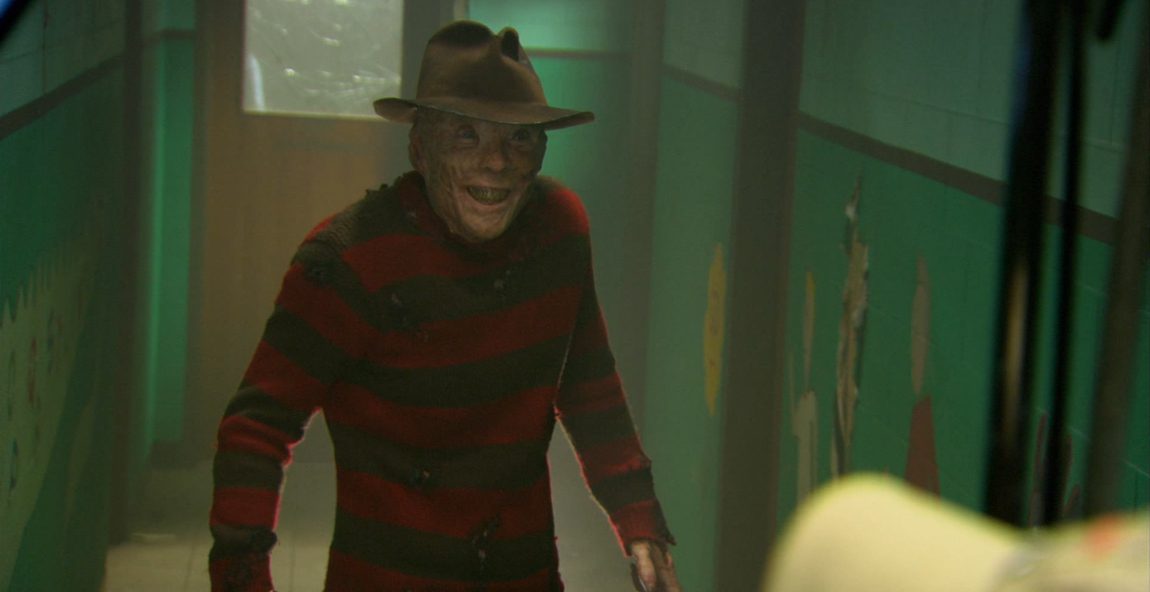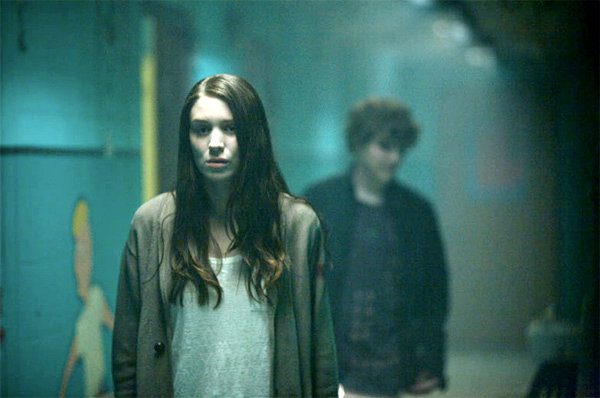“I can sleep. I just don’t want to.”
It’s starting to become conventional, accepted wisdom that there is, at times, good reason to remake a film. Maybe it’s because the original was garbage, in which case, go for it – for instance, I have no objection to the Friday the 13th remake, because Friday is the worst movie I’ve ever seen, and I’ve seen both Moulin Rouge! and The Black Dahlia. Sometimes you remake a film because you can bring modern sensibilities and technology to the production; this is what Peter Jackson did with King Kong, and the hour that film spends on Skull Island is one of the best horror films of the century so far.
Sometimes, though, you remake a film because the original was popular and you can use a remake to earn a quick buck. This is the case with 2010’s A Nightmare on Elm Street, which seems like a cash grab from the moment you see the words “Executive Producer Michael Bay.” Bay’s name on anything denotes a cash grab (except for Pain & Gain, which is oddly the only Bay film I’ll go to bat for), because he represents a soulless mentality that regards film as product and little else. At its worst, Nightmare falls into this trap, which is doubly frustrating because the bones of a really solid movie are here.
For instance, look at the cast, which is pretty stacked. The film boasts Jackie Earle Haley, Rooney Mara, Connie Britton, and Clancy Brown – imagine an indie film with that cast. None of them embarrass themselves, and they all do the best with the material they’re given, which is weirdly limp considering it comes from genuinely talented screenwriters Wesley Strick (Cape Fear) and Eric Heisserer (who wrote Arrival, bringing this film’s roster of Oscar nominees to three). But it’s hard to think that anyone here is doing much besides cashing a paycheck, because there just isn’t a compelling reason to remake A Nightmare on Elm Street, which was nearly flawless in its original incarnation.
I’ll give the film credit for starting in the middle, though. There’s very little setup, and we open on Dean (Kellan Lutz) trying to keep himself awake in a diner. Unfortunately, this is where director Samuel Bayer (a music video veteran who has worked with Green Day, Metallica, and P!nk; this is his only feature film) makes his first misstep. Wes Craven, in the original, made it nearly impossible to tell when a character had started dreaming (which inspired me to write a pretty kick-ass video game proposal in last year’s write-up of the original), but Bayer oversaturates everything so much that it’s achingly obvious when Dean starts dreaming. It’s not all bad, though; Freddy (Haley) invades Dean’s dream and forces him to slash his own throat, which is a pretty bold move. Nightmare came out in 2010, two years after Twilight, when America was considering the dire prospect of Kellan Lutz, movie star. So killing him off in your very first scene is a good way to show that no one is safe, and the fact that Dean’s death comes by his own hand is a nice inversion of the cold open to Scream.
One of my favorite storytelling devices in horror is when a film tells you that its main character is A, only to kill them halfway through and show that it was B all along. This was the only thing I liked about the original Friday the 13th, and Craven’s Nightmare did it even better. Bayer’s Nightmare tries the same thing, with less success. For most of the film we follow Kris (Katie Cassidy, slightly less annoying here than she is on Arrow), who dated Dean before he died. The problem is, the switcheroo is inevitable because the film so clearly wants to follow Nancy (Mara), because Mara is a damn movie star. She appeared in The Social Network this same year, and was a year out from her first Oscar nomination (for The Girl With the Dragon Tattoo), and even in a blatant moneymaker like this, she’s really good. She elevates the cast to her level whenever she shares scenes with any of them (this film is mostly remarkable for being the only time in history that Kyle Gallner will get billed above Rooney Mara), but her best scenes are opposite Haley.
Haley was an inspired choice for Freddy; he’s a genuinely compelling actor whose diminutive stature belies a sense of palpable menace. He more or less earned the part after 2009’s Watchmen, which is obvious because here he’s just doing the Rorschach voice (to be fair, it’s a great voice). It works, though, and Haley stops just short of the campiness that would subsume Robert Englund’s portrayal of the character. But the makeup here is doing him no favors at all; it somehow looks worse than the original, and has the side effect of making his face and mouth nearly immobile. The more we see of Freddy, the less scary he is, and this is unfortunate because Nightmare shows Freddy all the damn time.
I’ll applaud the film, though, for keeping Freddy’s original backstory intact, which is that he was a child molester, and not a child murderer, as he was in the original. He was killed by the parents of the kids as an act of brutal retribution, and Bayer’s Nightmare hews closest to Craven’s here because neither film achieves the commentary on mob mentality that they aim for. Quentin (Gallner) raises the interesting possibility that the kids all lied and Freddy was innocent, which could have put the victims in a nice morally gray area, but the film backs away from the implication by reaffirming Freddy’s guilt, because murdering teenagers in their sleep isn’t evil enough.
What the film really lacks is variety in Freddy’s kills (I found myself particularly missing the way Freddy’s arms elongated in the original). Most of the time he just stabs people, which is fine, I guess, but it becomes so rote and predictable that whenever the film tries to make a nod towards the original (as in Kris’s death) it just comes off as over the top and incongruous. When A Nightmare on Elm Street succeeds, it’s in its portrayal and cultivation of dread (Freddy’s clawed hand rising up through Nancy’s bathwater is an effective, uncomfortably sexual shot); when it goes bigger it feels like a splatter film that takes itself way too seriously.
Horror remakes are a fool’s errand. They’re typically approached with a more-is-more mentality that confuses gore with horror (the main failing of Eli Roth, every idiot’s favorite director). When Bayer eases up on the throttle with A Nightmare on Elm Street, it comes close to being as creepy and atmospheric as it needs to be. But this is the Michael Bay school of filmmaking, which teaches you that if something can be big, it should be. Even with my reverence for Craven’s original film, I’m not opposed to the idea of a remake of it. It could even retain most of this cast (Haley and Mara in particular). There’s a decent argument to be made in favor of a Nightmare for the social media generation, but this film doesn’t make it.
10/1: Dawn of the Dead
10/2: Drag Me to Hell
10/3: Pet Sematary
10/4: The Descent
10/5: Repo! The Genetic Opera
10/6: Desierto
10/7: The Blair Witch Project
10/8: Blair Witch
10/9: The Texas Chainsaw Massacre
10/10: A Nightmare on Elm Street (2010)
10/11: Prince of Darkness
10/12: 30 Days of Night
10/13: Friday the 13th (2009)
10/14: Slither
10/15: Tremors
10/16: Pandorum
10/17: It Follows
10/18: A Girl Walks Home Alone at Night
10/19: Poltergeist
10/20: Paranormal Activity
10/21: Creepshow
10/22: VHS
10/23: Nosferatu the Vampyre
10/24: An American Werewolf in London
10/25: The Witch
10/26: The Rocky Horror Picture Show
10/27: Cronos
10/28: The Hills Have Eyes
10/29: The Hills Have Eyes (2006)
10/30: Tucker and Dale vs. Evil
10/31: Halloween (2007)



